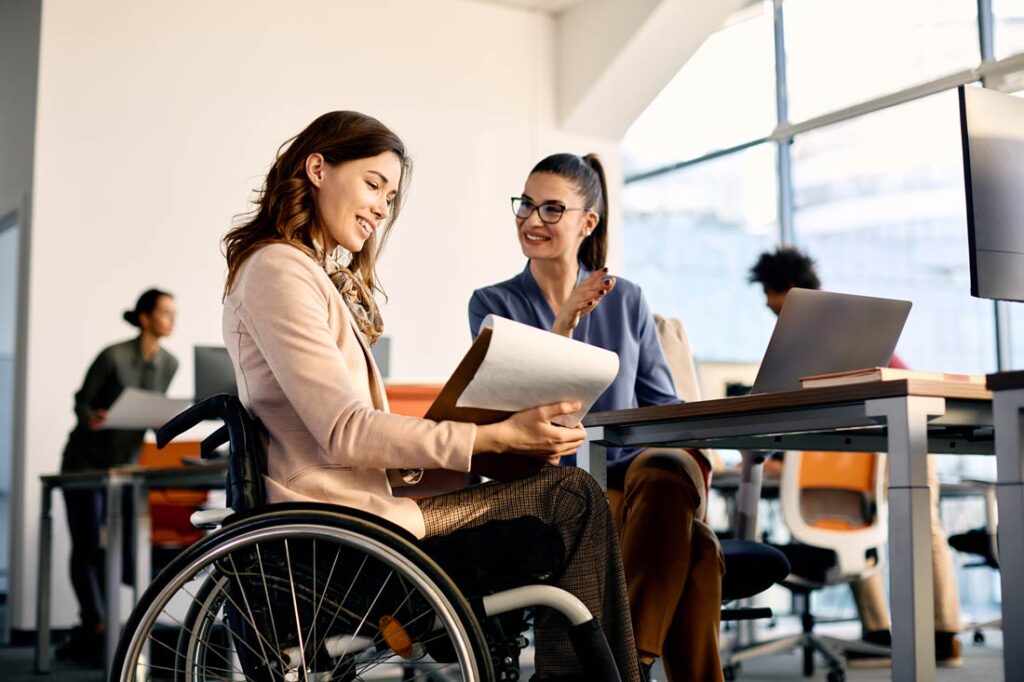When Jen Schlegel, founder of Beenabled and 119, began 2Gether International’s accelerator program, she experienced a sense of relief. “Nobody in my cohort was sitting around and spending their time trying to explain to anybody else why disability matters, or why accessibility matters or why someone should listen to why their product should matter,” she recalls.
Schlegel says she’s often the first person in entrepreneurial spaces to use a wheelchair or a feeding tube or to have the assistance of a service dog.
“I spend a lot of my time unintentionally educating people, and I’m happy to do it. But it’s definitely nice when you can show up in a space like [2Gether International] and not have to explain,” she says. “Everyone in the room already gets it. It kind of frees you up to focus on the other things, right?”
Schlegel’s experience skipping the preamble of explaining her disability with her 2Gether International (2GI) cohort isn’t a unique experience among the 700 disabled founders who have accessed the entrepreneurship support organization. (2GI prefers to use identify-first language to describe its “disabled entrepreneurs”).
Per their website, 2GI seeks to challenge the entrepreneurial ecosystem by supporting founders with disabilities and flipping the narrative to see disability as a competitive advantage for businesses. 2GI aims to fill the gap in entrepreneurial education for people with disabilities by operating a service funnel that begins with informal meetups open to anyone, then progressing to its Venture Labs programs aimed at supporting early-stage founders and concluding with an accelerator program that helps mature companies scale.
Reframing disability
Diego Mariscal, 2GI’s founder, CEO and chief disabled officer, grew up thinking he’d do anything except become an entrepreneur himself. He watched his dad work as an entrepreneur in Monterrey, Mexico, which Mariscal describes as the Silicon Valley of Mexico. Mariscal initially traveled to Washington, D.C., to study and work in international policy. However, Mariscal—who has cerebral palsy, which affects his ability to walk—quickly found that no one was talking about disability in the context of entrepreneurship.

“I realized that disability and entrepreneurship are essentially two sides of the same coin, meaning that as a person with a disability, you have to figure out how do we dress, [how do we] drive, how do we communicate. [All] those are inherently entrepreneurship skills—resiliency, creativity, tenacity, collaboration,” Mariscal says.
Although programming at other organizations and agencies is technically open to disabled entrepreneurs, often the resources are difficult to utilize due to accessibility issues. Mariscal says 2GI’s programming differs from these resources because accessibility is baked into the program’s DNA. He hopes to grow 2GI to include impact funds that can make important investments based on the entrepreneur’s identity, not just the industry in which they’re working.
Building a wider network
Mariscal sees a wide network of people with disabilities who could benefit from entrepreneurship. The World Health Organization estimates there are 1.3 billion people globally with a disability. It’s the world’s largest minority group, and one that’s incredibly diverse: it transcends sex, age, gender identity, sexual orientation, race, ethnicity and economic situation.
It’s also a group that anyone can enter at any time, whether through an illness, an accident or by aging. “It is a natural part of the human experience, meaning, if we live long enough, we’re all going to acquire a disability at some point in our life. And so it is imperatively critical that we are building a world and supporting a world that is built for us…for future us,” says Mariscal.
2GI aims not only to create economic development among people with disabilities—in 2023, more than 25% of people with disabilities lived in poverty in the United States—but also reframe the way the world thinks about disabilities. “There’s a huge opportunity to…shift the way people think about disability from a limitation to really a competitive advantage,” Mariscal says. “You’re not going to be successful as an entrepreneur in spite of your disabilities. You’re going to be successful in many ways because of your disabilities.”
2GI’s lessons in practice
Heather Lawver, founder of Ceemo, says her conversations with fellow founders in the fall 2022 2GI accelerator often centered around, “How do I sell disability as the strength that it is, rather than the weakness that most people think it is?”
Lawver became an entrepreneur because she found it difficult to maintain a typical 9-to-5 job with her disability. Entrepreneurship afforded her the flexibility to work as she was able as she navigates having two rare genetic diseases that cause chronic pain.
When the demand for her business—helping other underrepresented founders raise capital, including those with disabilities—grew larger than she was able to meet, she decided to create an app to scale her process.
“Ceemo is your friendly, automated [chief marketing officer],” Lawver says. We make it easier for every founder to access and develop data-backed, customer-focused branding and marketing.” She says 2GI’s program helped her step outside herself, re-evaluate what she’s looking at and find more effective ways to do what she does best. Since finishing the accelerator, she launched her app and has helped other founders raise more than $200 million in capital.
Finding a competitive advantage
Lawver and her fellow founders have found a competitive advantage in serving people with disabilities. The global disability market is estimated at more than $18 trillion in spending power. Many disabled founders create businesses and products for other people with disabilities because they’ve identified an unmet need and aim to meet it.
Lawver says she understands the challenge of asking people to think about and/or identify with the disability community. “The challenge inherent in being that minority is that no one wants to think that it’ll be them. You’re literally butting up against people’s sense of mortality, control and existential dread,” she says. “It’s really hard to overcome, but I choose to think about it as an engineer. And for engineers, they always tell you when you’re creating something, design for the edge cases…because that’s where you’re going to find the gaps…and you’ll make a better product for everyone. If you can design with disability in mind, everyone else is going to benefit from that solution, too.”
Schlegel, too, trained her innovation skills on the edge cases, which turned out not to be so far-flung after all. She created equitable technologies as a response to her personal experiences, but her 119 software could aid anyone with a disability, chronic health condition or who is aging.
Battling adversity
Schlegel was born with cerebral palsy and an autonomic nervous system disorder. While she was in college, her health conditions grew more complex. She now has 15 polychronic health problems.
Under the umbrella of Beenabled, she took one of her three projects into 2GI’s accelerator program. 119 is a medical alert communication tool to guide bystanders in an emergency.
“In a public medical event, your first responder isn’t a paramedic, it’s [a] bystander who found you,” she says. She developed 119 to answer: “How can we support them in getting the right care to someone having a recurring medical event?”
Schlegel has completed several accelerators and says she benefitted from 2GI’s soft skills tutelage, which included writing cold emails. Since graduating from the September 2024 accelerator program, she’s pursued the business with the support of an angel investor and is poised to enter the FDA approval process to get 119 approved as a medical device.
“Three of the largest markets in the U.S., in no particular order, are teenagers, aging and disability…There’s a lot of advocacy power, a lot of business power, a lot of dollars. I think we do it all a disservice when we keep framing things in the space as just serving some niche community,” she says.
Photo by Drazen Zigic/shutterstock.com










